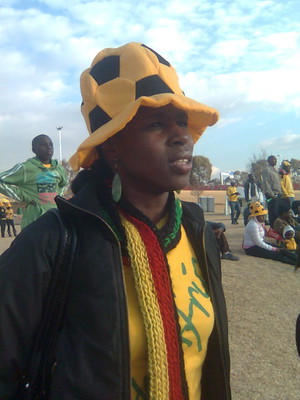Lessons Africa Must Learn from the World Cup
By Eric Sande
 Beyond the tentacles of Paul the octopus who raised enthusiastic hopes with his preternatural accurate match predictions, the vuvuzela, and the razzle-dazzle in the land of the legendary Madiba, the recently concluded 2010 FIFA World Cup provides vital lessons for the continent.
Beyond the tentacles of Paul the octopus who raised enthusiastic hopes with his preternatural accurate match predictions, the vuvuzela, and the razzle-dazzle in the land of the legendary Madiba, the recently concluded 2010 FIFA World Cup provides vital lessons for the continent.
Pelé’s notable prediction that an African team would lift the World Cup trophy by the end of the last century did not come to pass.
Talks of a landmark for Africa where the continent’s long-derided “lion” economies could significantly be upraised and the vanquishing of Afro-pessimism were heard from all corners. President Jacob Zuma, once said in his lunch address: “Africa should be a new node of global economic growth” and no longer be seen as a permanent recipient of aid”. Yet the tournament did not turn out to be such a cash cow for South Africa and Africa at larger.
Udesh Pillay, a researcher at the South African Human Sciences Research Council, said the World Cup was not to be of any economic benefit to a country where many people still do not have electricity or running water in their homes.’ Although 150,000 jobs were created in the build-up to the event, they were temporary. It would be impossible to say that the event has reduced poverty,’ he stated.
Out of the 32 qualified teams for the FIFA 2010 World Cup none pitched camp in Africa for their match preparation as previously expected.
Most of the official FIFA merchandise was manufactured in China, including Zakumi, the cuddly leopard figurine that served as the official 2010 World Cup mascot. The official song for the match was also composed by ‘foreigners’. This led to a formal protest by South Africa’s powerful umbrella trade union COSATU (Congress of South African Trade Unions) demanding that all the World Cup paraphernalia must be manufactured in South Africa in order to create jobs and leave a lasting legacy of the tournament.
Consultancy firm Grant Thornton, which conducted an in-depth research into the impact of the World Cup on the country, said at a press conference in April that about 230,000 foreign ticket holders would be in South Africa for the tournament, down from its earlier prediction of 450,000 overseas visitors. Another 85,000 fans from the rest of Africa and 20,000 other overseas visitors would travel without tickets to enjoy the atmosphere at urban fan parks where games where were shown on big screens.
The global recession, the high cost of long haul travel to South Africa and the country’s high crime rate -50 murders a day – Seem to have deterred fans from outside of Africa. Poor domestic ticket sales were being blamed on high prices and the use of internet to distribute them, which is possibly the worst distribution method for the region given the lack of access to the internet and slow connections.
Critics say South Africa should have been spending money not on expensive soccer stadiums but on more pressing issues such as wide spread poverty, unemployment, and the highest number of people infected with HIV/Aids in the world. The latest Human Development Index on measures of education, life expectancy and standard of living ranks South Africa 129 out of 182 UN member states, making it one of the most unequal nations in the world.
It is known to many that football has been one of the most visible signs of Africa’s skills exodus: the very best African players are quickly snapped up to play for European leagues where they have become omnipresent. They represent just a tiny proportion of the skilled Africans of all trades and professions who leave the continent. According to the United Nations Economic Commission for Africa (UNECA), about 27,000 Africans left for industrialized countries between 1960 and 1975. Now, an equivalent number leaves the continent every year.
Many African professionals including our football stars Samuel Eto’o, Michael Essien, Didier Drogba and others live abroad. If the continent is to overcome the brain drain of this emigration, African countries should find ways to lure them home.



